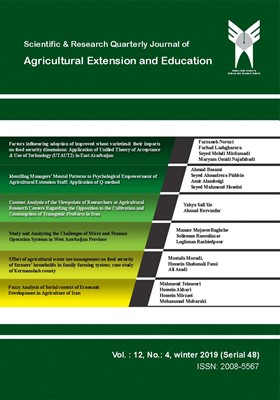Fuzzy Analysis of Social context of Economic Development in Agriculture of Iran
Subject Areas : Agricultural Extension and Education Researchmahmoud teimouri 1 , hossein akbari 2 * , hossein mirzaei 3 , mohammad mobaraki 4
1 - PhD student of Economic Sociology and Development, Ferdowsi University of Mashhad, Mashhad, Iran
2 - Faculty member of the Sociology Dept.
Ferdowsi University of Mashhad, Iran
3 - Faculty member of the Sociology Dept.
Ferdowsi University of Mashhad, Iran
4 - Faculty member of the Sociology Dept. University of yazd, Iran
Keywords: Agriculture, Fuzzy Analysis, Economic Development, Social contexts, Iran,
Abstract :
The present study is an attempt to explain the the mechanisms and social impacts on economic development in the agricultural sector by extracting the causal and hybrid route. The method of this study is comparative-quantitative and the data set of 31 provinces of the country has been analyzed using the fuzzy logic approach. The results of the necessary and sufficient conditions showed that the condition of economic habitus (credit ethics), economic habitus (low imposed traditionalism), economic habitus (low degree of satisfaction), reciprocal economic action (work), reciprocal economic action (the expansion of instrumental relations) And the reciprocal economic action (calculation) of each alone is a necessary condition and economic habitat (economic rationality) is a sufficient condition for the outcome (agricultural development). In the causal and hybrid causalities, four causal paths of Ali were necessary based on the theoretical and experimental adequacy criteria (coefficient of coverage and adaptability), and the essential causative components that have an appropriate compatibility and coverage index, the condition of economic habitus (credit ethics ) Is common and is introduced as a necessary final condition.
ازکیا، م.، و غفاری، غ. (1393). جامعهشناسی توسعه، چاپ هفتم، تهران: انتشارات کیهان.
اکبری، ح. (1390). بررسی تطبیقی تاریخی عوامل و موانع تشکیل اجتماع ملی در کشورهای در حال توسعه با تاکید بر ایران، دانشگاه شهید بهشتی، رساله دکتری جامعهشناسی.
چلبی، م. (1388) شاخصسازی تابع عضویت فازی، نوعشناسی و واسنجی در جامعهشناسی، مجله مطالعات اجتماعی ایران، ویژهنامه روششناسی، دوره 3، شماره 4 (شماره پیاپی 8)، صفحات 28-6.
راگین، چ. س (1394). بازطراحی بررسیهای اجتماعی: مجموعههای فازی و فراتر از آن، ترجمه خلیل میرزایی، هادی برغمدی و فرید ناهید، چاپ اول، تهران: فوژان.
رفیعپور. ج. (1378). خرده فرهنگ دهقانی و ترویج کشاورزی، مجله جهاد، سال نوزدهم، شماره 222 و 223، صفحات 110-101.
کرمپور، م.، و یوسفوند، س. (1391). بررسی خرده فرهنگ دهقانی راجرز (بررسی موردی: روستاهای منطقه کهمان، شهرستان سلسله)، نشریه توسعه روستایی، دوره 4 ، شماره 2، صفحات 164-139.
مطیعی لنگرودی، س. ح.، غلامی، ع.، و محمدزاده لاریجانی، ف. (1394). رویکرد بومی به نظریه خرده فرهنگ دهقانی راجرز با تأکید بر روشهای کمی (مطالعه موردی: دهستان سکمن آباد شهرستان خوی)، مجلّه پژوهش و برنامهریزی روستایی، سال چهارم، شماره 11، صفحات 175-157.
هینز، ج. (1393). مطالعات توسعه، ترجمه رضا شیرزادی و جواد قبادی، چاپ دوم، تهران: آگاه.
Bourdieu, P. (2005) The Social Structures of the Economy. Cambridge: Polity Press.
Bourdieu, P. (2017). Habitus. In Habitus: A sense of place. Routledge.
Bourdieu, P., Boltanski, L., & Chamboredon, J. C. (1963). La Banque et sa clientèle. Éléments d’une sociologie du crédit, Paris: Centre de sociologie européenne de l’École Pratique des Hautes Études.
Byrne, B. M. (2010). Structural Equation Modeling with AMOS Bcasic Concepts, Applications, and Programming. New York: Taylor and Francis Group.
Foster, J. B. (2015). The new imperialism of globalized monopoly-finance capital: an introduction. Monthly Review, 67(3), 1-5.
Frank, A. G. (2018). The development of underdevelopment. In Promise of development, Routledge.
Gudynas, E. (2018). Extractivisms: Tendencies and consequences. In Reframing Latin American Development (pp. 61-76). Routledge
Hulland, J. (1999). "Use of partial least squares (PLS) in strategic management research: a review of four recent studies", Strategic Management Journal 20(2):195-204.
Lebaron, F. (2004) ‘Pierre Bourdieu: Economic Models against Economism’, pp. 87–101 in David Swartz and Vera Zolberg (eds) After Bourdieu: Influence, Critique, Elaboration. Dordrecht: Kluwer.
Rogers, E. M. (2010). Diffusion of innovations, New York: Simon and Schuster.
Srubar, I. (2017). Neil J. Smelser, Getting Sociology Right. A Half-Century of Reflections. Berkeley/Los Angeles/London: University of California Press 2014, 325 S., gb., 55, 50€. Soziologische Revue, 40(2), 301-304.
Steinmetz, G. (2011). Bourdieu, historicity, and historical sociology. Cultural Sociology, 5(1), 45-66.
Swedberg, R. (2011). The economic sociologies of Pierre Bourdieu. Cultural sociology, 5(1), 67-82.
Todaro, M. P. & Smith, S. (2012). Economic Development, New York: Pearson.
_||_
